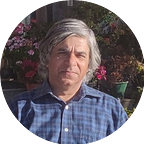That Ringing Sound
On this Day of Holi
I am sitting in my small home office on the 8th of March, 2023, and typing the first draft of this post. Today, we celebrate Holi in India, our famous festival of color. After I experienced a few celebrations with people rubbing boot polish, cow dung, and silver paint on my face, I refrained from the festivities.
So, this morning, I sat alone at home, glorying in the solitude and silence. The mornings are pleasant even now, and when I sat on my balcony, I could hear the birds again this morning. The last time I listened to the birds was during the pandemic lockdowns. This time, the sound of festivity punctured the birdsong. I was grateful that the cacophony of economic development did not shatter the calm.
Heat and Noise
Since the pandemic ended, construction activity has picked up, leading to noise and dust pollution. People are mad, paying ridiculous sums for apartments. Concrete is replacing woodland, and February’s temperatures in India are the hottest since 1901, per an article in “The Hindu” newspaper. You can read these two articles here and here.
But this post is not about the heat. While I am preoccupied with heat, I want to return to noise. I am focusing again on traffic noise pollution. The US Environmental Protection Agency and the WHO set a limit on safe noise levels. They focus on the decibel value of the noise and the time a person is exposed to it.
Fatigue
I am a metallurgical engineer, and while in college, I learned about fatigue fractures. When you consider the two factors, you realize the two factors work in conjunction. When you subject a metal, or any material, to tensile stress (or shear stress or any other stress) over a prolonged period, the material fails. In layperson’s parlance, the material becomes tired.
Exposure to loud noise impacts us. When exposed to a sudden noise, you may compare it to a hard slap on the face. But the long-term impact is often different when exposed to loud noise over a sustained period. Prolonged exposure will have a higher degree of mental & emotional impact than short, sudden exposure.
The US Environmental Protection Agency (EPA) and the WHO specify safe noise levels to be below 70dBA over 24 hours or below 75 dBA over eight hours. In contrast, noise levels in Delhi’s traffic are 75dBA to 80dBA. At intersections, noise levels reach 80-dBA to 85-dBA. There are some crossings where it crossed 106 dBA. Hallelujah!
When I was in the parking lot at Delhi’s international airport a week back, the noise levels crossed 100-dBA. People were honking without pause, and the cacophony reverberated from the pillars, floor, and ceiling. There was no escape from hell.
Tinnitus
A week ago, I saw a Tweet from someone referring to tinnitus. Tinnitus is when you have a ringing sound in one or both ears. All of us have experienced this in our lives. Play music too loud and wear headphones. You may feel a buzz when you take the headphones off for a few seconds. You may experience a ringing sound if you are listening to death metal. Nowadays, most smartphones caution you when you raise the volume beyond a safe limit.
I also discovered that the din from traffic could cause tinnitus. We Indians are unaware of this; as of 2006, only one doctor in India was treating this condition. Dr. Kumar estimated that over 17% of Indians above 40 suffer from tinnitus.
That was 2006, and the situation has worsened.
We Must Start Somewhere
What can we do?
Solutions that people like me propose sound generic, but they must consider the realities of life in India. Similar problems exist in many parts of the world, and every nation must deal with its issues while seeking common ground where possible.
We have laws in India, and some of them are good. Our problem lies in implementing our regulations. For instance, we have many traffic cameras, but people continue to speed, drive the wrong way and break traffic lights.
Second, we have a problem with our attitude. Not only do we place undue faith in our gods, but people in this part of India come with an inbuilt–hollow -machismo. This statement holds nationwide, but North Indians are most guilty of this behavior.
What can we do?
· Create awareness. I know this sounds like a generic statement, but unless we start here, nothing will change. We have an awareness issue, which exacerbates the problem. While conducting internet searches, I noticed the lack of articles addressing this problem. The few articles I found are four to five years old.
· Give people exposed to noise proper noise protection gear. Traffic police officers and laborers are among those who must get adequate protection.
· Develop standards and educate law enforcement people.
· Create and implement laws. Once police officers realize the adverse health impact of noise, they will enforce the rules. They are among those most affected by the jarring sound of traffic.
We must start now.
Links. In No Particular Order
2. https://my.clevelandclinic.org/health/diseases/14164-tinnitus
3. https://www.nidcd.nih.gov/health/tinnitus
4. https://pubmed.ncbi.nlm.nih.gov/24533358/
5. https://www.hear-it.org/very-high-prevalence-hearing-loss-india
8. https://ehp.niehs.nih.gov/doi/10.1289/EHP11248
13. https://www.noisyplanet.nidcd.nih.gov/parents/too-loud-too-long
15. https://www.asha.org/public/hearing/loud-noise-dangers/
18. https://www.wjrr.org/public-awareness-of-the-impacts-of-noise-pollution-on-human-health-
